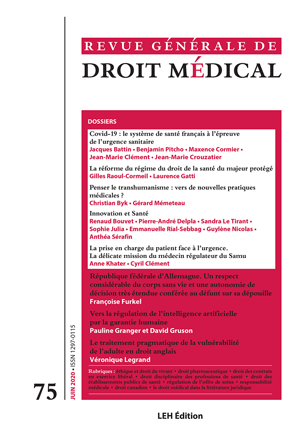Résumé
En oncologie pédiatrique, le séquençage de nouvelle génération peut conduire à découvrir, de manière fortuite, des informations génétiques sans lien avec la pathologie initiale. À ce jour, l’encadrement juridique de ces données, dites incidentes, reste flou car elles ne font pas systématiquement partie de l’information délivrée préalablement au recueil du consentement et ne sont pas toujours transmises au patient et au mineur en particulier. Si la loi actuelle protège de façon spécifique la réalisation des tests génétiques chez les mineurs, il est légitime de poser la question de la pertinence de ce cadre au nom du respect de leur autonomie. Afin d’améliorer les pratiques de soins et la protection du droit à l’information, le projet de loi de bioéthique propose des solutions visant à organiser la communication de ces données mais sans tenir compte de la situation particulière du mineur.
Mots-clés
Oncogénétique – Données incidentes – Mineur – Droit à l’information – Autonomie
Abstract
In pediatric oncology, next-generation sequencing can lead to the discovery, by chance, of genetic information unrelated to the initial pathology. To date, the legal framework for this so-called incidental data remains unclear because it is not systematically part of the information delivered prior to obtaining consent and is not always transmitted to the patient and the minor in particular. If the current law specifically protects the performance of genetic tests in minors, it is legitimate to ask the question of the relevance of this framework in the name of respect for their autonomy. In order to improve care practices and the protection of the right to information, the bioethics bill proposes solutions aimed at organizing the communication of these data but without taking into account the particular situation of the minor.
Keywords
Oncogenetics – Incident data – Minor – Right to information – Autonomy



